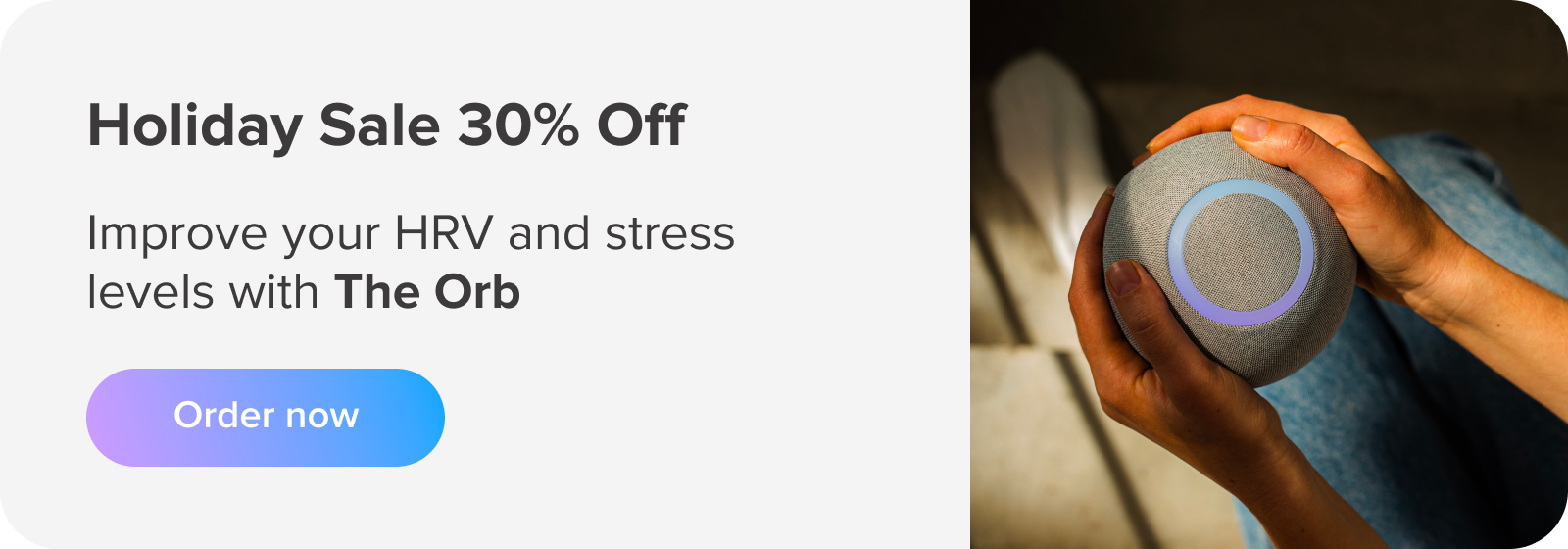Ensuring that your body functions optimally is the key to feeling your best, and the mind can have a profound impact on your physical well-being – HRV included! Continue reading to learn what you can do to improve your HRV and its vital role in your mental and physical state.
Low HRV vs. High HRV
Heart rate variability (HRV) measures the time between each heartbeat, but what do the measurements mean? What is low HRV and high HRV, and how do they compare? Which should you be striving for?
Low HRV means there is less variability between heartbeats, or in other words, there is a uniform spacing between each heartbeat. This is an indication that your body is underperforming in the face of stress, whether from over-exercise, illness or pain, or psychological events.
On the other hand, a high HRV means that the spacing between heartbeats is more varied. Instead of a uniform 0.5 seconds between heartbeats, the spacing might be something like this: 0.5, 0.7, 0.3, 0.5… or any other variating sequence. This is a good sign because it means that your body is responsive to stress, and your heart is adapting to changing stress levels quickly and appropriately.
A higher HRV is associated with better health, as it indicates that the body’s stress response is more effective. But it’s not that simple. The meaning of “higher” HRV will vary from person to person, depending on all sorts of factors, such as age, biological sex, fitness level, and overall heart function. HRV isn’t one-size-fits-all. What’s considered “normal” for you might be regarded as high for someone else, or vice versa.
Importance of Measuring Your HRV
Maintaining good health involves so many different aspects of life – diet, exercise, mental health, even social life. Is keeping your heart rate variability at an optimal range something you should be tracking? Why not just focus on heart rate and pulse?
The reason is that HRV is measuring something entirely different to heart rate. Of course, making sure your heart rate is within the healthy range is vital but heart rate variability can provide a window into how your body is functioning, more so than simply measuring heart rate.

HRV can provide you with clues about how your lifestyle is affecting your physical health, and how well your mind and body are reacting to stress.
Most importantly, your HRV can tell you a lot about your autonomic nervous system, which controls your sympathetic nervous system (your fight or flight response), your parasympathetic nervous system (your relaxation response), and many vital functions of your body, including:
- Blood pressure
- Digestion
- Heart rate
- Breathing
OK, but that sounds complicated to measure, right? Wrong! Thanks to amazing advances in physiological tracking technology, there are accurate, at-home devices available to help you measure and track your HRV, so you can work on improving it.
My HRV is low, how can I improve it?
Let’s say you’ve been tracking your heart rate variability, and it’s on the lower side. At the same time, you’re feeling fatigued, anxious, and just a bit down and out. Can you improve your HRV and thereby improve your overall sense of well-being? Actually, you can.
You absolutely don’t have to live with low heart rate variability – there are several things you can do in your day-to-day life to make improvements and slowly lead to a higher HRV.
9 Lifestyle Guidelines for Improving Your HRV
#1: Get Consistent, Quality Sleep
Just one more chore, one more hour of work, or one more episode of your latest Netflix binge! There’s no end to the reasons why you have to go to bed late, but the fact remains that a good night’s sleep is one of the most important components of physical and mental well-being.
What’s more, lack of sleep could be contributing to your low HRV too.
Getting enough quality sleep improves your HRV while potentially reducing the chances of chronic conditions like high blood pressure, obesity, and diabetes, as well as alleviating the consequences of mental distress.
But it’s not just about getting enough sleep – you also must maintain a consistent sleep schedule. Consistency is the key to getting more of that precious REM sleep, improving your circadian rhythm, and increasing your HRV.
#2: Focus on Your Breathing
When you’re feeling stressed, overwhelmed, or overstimulated, what’s one of the first things you’ve been told to do?
Take a deep breath.
Intentional breathing is an incredible relaxant. It helps control debilitating symptoms of anxiety, like breathlessness, rapid heart rate, dizziness and tingling. And it’s also one of the easiest techniques to improve your HRV. When you practice intentional breathing, your body’s HRV naturally synchronizes with your breath, resulting in reduced anxiety, tension, and an overall feeling of calmness.
When you focus on taking slow, deep breaths, your parasympathetic nervous system kicks into gear, helping balance your stress response, and you will find that your HRV begins to rise too.
#3: Know Your Aerobic Threshold and Train Below It
There’s a very common reason that you may not be seeing improvements in your HRV: training above your aerobic threshold. When you train too heavily, you also breathe too heavily, which puts enormous strain on your body. Your body is practically begging you to stop, but you keep going…
Although regular exercise is one of the best ways to improve your HRV, over-training may in fact lower your HRV.
Without giving your body what it needs to recover, or by training outside of your aerobic threshold, you may inadvertently cause your HRV to lower. You can alleviate this and improve your HRV by striving for balance between getting enough exercise and making sure not to strain and exhaust your body.
#4: Practice Cold Thermogenesis
When you’ve had a bad night’s sleep, or you can’t concentrate, what do you instinctively do? Splash cold water on your face. Without even realizing it, you may also be setting yourself up for successfully improving your HRV.
Cold thermogenesis involves intentionally exposing your body to cold for short periods of time. This helps to open cellular pathways in the body and often results in decreased stress levels, better focus, increased circulation, and, you guessed it, improved HRV.
#5: Prioritize Diet and Nutrition
You’ve been told for years that eating a nutritious diet is one of the key components to maintaining your health.
While what you eat plays a prominent role in improving your HRV, it’s also vital to consider when you are eating and the effect the timing has on your circadian rhythm.
Research strongly suggests that specific nutrients and when you eat those nutrients can influence your HRV in a positive – or negative – way. According to the study, eating high-fat or carbohydrate-rich food can lower HRV, and keeping a healthy, balanced diet based on consistent meals will help maintain stable blood sugar, reduce bodily stress and promote good HRV.
#6: Watch Your Alcohol Intake
You enjoy your glass of wine a night – or a beer or two on weekends with friends. Either way, if you’re looking to improve your HRV, consider how much alcohol you’re consuming.
Aside from having negative effects on your brain, liver, and pancreas, alcohol has also been shown to lower your HRV. Drinking a moderate, or even small, amount of alcohol may cause a temporary spike in your heart rate and lower your heart rate variability.
If you are concerned about your HRV and looking for ways to improve it, consider avoiding alcohol for a period of time to help you determine whether it is one of the factors causing a lower HRV.
#7: Stay Hydrated
Have you ever felt lethargic, anxious, or downright lousy, and thought “I’ve done everything right, I’m not sick. Why am I feeling this way?”
It could be that you are simply not drinking enough water. Even mild dehydration can trigger physiological stress and lower your HRV, while also reducing brain function, worsening your mood, and raising anxiety levels. So, if you’re worried about your HRV rate, mood, and overall health, pay more attention to how much you are hydrating – aim to drink between 11 to 15 cups of water a day, depending on your gender, body size, and level of physical activity.

#8: Manage Mental Stress
When you are in a good place mentally, meaning you are in control of your emotions, are feeling positive, and handling stress well, then your HRV will typically be higher.
So if you’re doing all the obvious things right, like eating correctly, exercising regularly, and staying on top of your hydration, but your HRV is on the low side, consider asking yourself if you are facing a lot of stress and how well you are managing it.
When you’re in the middle of a potentially stressful task or situation, do you find your blood pressure or heart rate increasing? When this happens, you may also find that your HRV is decreasing too.
Track the activities that cause you mental stress. What are some ways you can manage that stress? Could you take yourself out of the situation? Could you work less and find time to develop a hobby? Maybe you find peace by getting outside, going for a run, meditating, or listening to your favorite music. Finding paths to stress management and relaxation are really important to achieving a lower HRV.
#9: Make Meditation Part of Your Routine
Practicing meditation and mindfulness is helpful for reducing stress, anxiety, chronic pain, high blood pressure, and even the chances of heart disease. It can also greatly improve your HRV. How does it do all this? By increasing parasympathetic activity in the nervous system, and getting your body into a naturally relaxed state.
The thing about meditation is that it takes regular practice to really see the benefits, so make it a part of your daily routine. Taking 10 to 20 minutes out of your day to meditate can significantly affect your overall health and HRV.
Improving Your HRV: The Bottom Line
The most important thing to remember about improving your HRV is that it is highly individual. What works for you, won’t be the best way for another. So don’t bother comparing your HRV to anyone else.
Improving your HRV may involve some trial and error to find what works for your body and your lifestyle – and it takes time.
Explore the different guidelines mentioned in this article, and see which ones you can incorporate into your routine. Over time, these will not just boost your physical and mental well-being, but you may find that they help improve your HRV too – with all the amazing benefits that bring.






